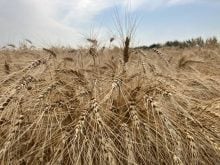A federal cereal breeding program has entered a funding arrangement with the Alberta Wheat Commission and Canterra Seeds, a Winnipeg-based seed company.
Under the deal, Canterra and the wheat commission will contribute cash and in-kind resources to Agriculture Canada’s Canada Prairie Spring Red wheat breeding program at its research centre in Lethbridge.
The resources will allow CPSR wheat lines from the Lethbridge program to be tested at more sites in Western Canada and give the program’s senior breeder, Harpinder Randhawa, access to more robust performance data collected from more test sites and a wider range of growing conditions.
Read Also

Canada offers tariff relief to some steel, aluminum products from U.S., China
Canada offered tariff relief on some steel and aluminum products imported from the U.S. and China, a government document showed, in efforts to help domestic businesses battered by a trade war on two fronts.
In return, the commission will receive a share of royalty revenues derived from new lines developed by Randhawa’s program. Canterra will secure exclusive distribution rights to some of the registered CPSR varieties developed at the research centre.
The arrangement, which is being billed as an example of a public-private-producer research partnership, will add $3.4 million worth of additional resources to Lethbridge’s CPSR program.
The commission is expected to contribute approximately $750,000 over five years.
“The Government of Canada is proud to join with Canterra Seeds and AWC as we take another major step forward for wheat breeding in Canada,” said federal agriculture minister Gerry Ritz, who announced the partnership July 8.
“Each of these partners bring their own skills and resources to drive competitive new Canadian Prairie Spring wheat varieties for producers across the Prairies.”
Commission chair Kent Erickson said the organization’s intent is to redirect all royalty revenues from the deal back into CPS research and development.
“Our goal is to bring products to market that will help grow farmers’ profitability and competitive edge,” he said.
The commission will also have an opportunity to influence breeding priorities at Lethbridge by providing producer input on wheat disease, insect and fertility issues that affect CPSR production.
“Our hope is to … take that information to the CPS program so that Harpinder has some producer input on what we as farmers are looking for,” Erickson said.
“Another important factor is that it’s an Alberta institution.”
Canterra chief executive officer Dave Hansen said his company will provide technical and field testing support for the CPSR material coming out of Lethbridge.
“We see this as a win-win for the producers in Western Canada and it also helps to secure the future of Harpinder’s CPSR program in Lightbridge,” he said.
“The Lethbridge program will be provided with more field testing that Canterra brings to the table, more quality testing … and certainly more cash, which is obviously a significant component of any breeding program.”
Canterra will receive the first-right-of-refusal on a pre-determined number of new CPSR varieties each year. The company sees CPSR as a class of wheat that has significant market potential in evolving food markets, particularly in Asia.
“In essence, this will add to our product portfolio in a grain class that we see as very, very important.”
CPSR varieties acquired by Canterra will be multiplied by the company’s network of seed grower shareholders and distributed to commercial grain growers.
Canterra is owned by shareholders, which include independent agricultural retailers and approximately 175 western Canadian pedigreed seed growers
Other Canterra shareholders include European seed breeding company Limagrain, Ceres Global Ag and private investors.
Sources close to the deal said the commission will make a pre-determined financial contribution over the next five years.
Canterra’s commitment is not expected to result in a reduction of Agriculture Canada’s current testing capacity.
Contact brian.cross@producer.com















